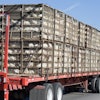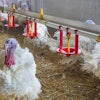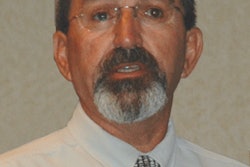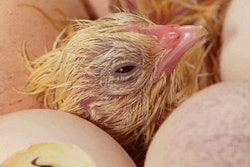"Being in the commodity business is something that I never wanted to be in," said Mark Haskins, MBA Poultry's founder, president and CEO. After working in the poultry industry in the USA and abroad, Haskins thought that a premium market could be developed in the USA for air-chilled chicken. When MBA Poultry, Tecumseh, Neb., opened its doors in October of 1998, air-chilling technology was widely used in Europe but had not been tried in the USA. Haskins believed that air-chilling would provide a point of product differentiation that could allow his company to rise above the commodity price wars and sell product profitably, year in and year out.
The road that Haskin's company has traveled in the last seven years hasn't always been smooth, but MBA has continued to innovate and look for ways to differentiate its products from those of other poultry companies. "After our identification of a (market) niche with air-chill, a niche player is always jealous of the space that they occupy, and my quest and my goal are always to improve our niche so that duplication is more difficult," Haskins said. The air-chilling process that MBA uses is completely dry, no immersion tanks or water sprays are incorporated in the chilling system. There are two chambers in the air-chilling system, the first removes around three-quarters of the heat from the bird and the second reduces bird temperature to 32 to 34 F.
Haskins explained additional steps that MBA has taken to differentiate its products. "Our next phase was to go to an antibiotic-free, all-natural diet for the birds where we feed no animal by-products or animal fat. The diet is all corn, soy, soy oil and micronutrients," he said. MBA started the "veg" diet with one customer in 2001, and by 2003 all MBA's birds were eating it. A coccidiostat is included in the "veg" diet, but no sub-therapeutic antibiotics are used.
In October 2003, the USDA approved standards for producing organic broilers. Haskins believed that the USDA organic standards offered his company an opportunity to distinguish itself further from the competition. "I felt that the playing field was level for anyone who wanted to try and occupy some of that retail space, and we went about getting ourselves certified for organic production," he said. Organic production started at 5,000 head per week and in a year and a half it has grown to 50,000 head per week.
MBA took another step to differentiate itself in the marketplace in January of 2005, when it went online with a Stork controlled atmosphere stunning (CAS) system. Haskins explained what prompted his company to make the move to CAS from electrical stunning. "We get a lot of e-mails from our consumers, and the vast majority of them are extremely complimentary. But a high percentage of the questions that we get asked is how we sacrifice our birds. Using electrical stunning, no matter how you describe it, never can sound like something that people who are concerned about the welfare of the animal are going to enjoy hearing. I had been in Europe touring the industry and seeing what is out there, and I saw the CAS system. I liked the fact that the birds are not vocalizing any longer, they aren't scared, they go to sleep. It just felt to me like something that was right for us. Again, it was an answer in furtherance of our niche, that we are doing something different and something unique. We pioneered air-chilling, and now we are pioneering CAS in the USA. It fits our business model, and that is why we did it."
When asked about the effect of the CAS on plant operations, Haskins said that the company has seen improvement in the pack-out grade. "Some of the results that we have gotten I did not assume we would get when we decided to go forward. Our bleed-out is better; the birds don't do damage to themselves when they are here any longer. It is just a better system for us. I don't know that it is for everybody, but it is right for us," he said.
The cumulative effects of the degree of product differentiation and a lot of hard work marketing and selling the Smart Chicken brand have been paying dividends for MBA. The company now has distribution in over 4,000 stores in 40 states, from Massachusetts to California. But the technology that gave MBA its first point of differentiation, air-chilling, almost ended Haskins dream before it got started.
A Bump In The Road
The Campbell's Soup poultry processing plant in Tecumseh, Neb., had been a fowl plant for years before it was converted to processing broilers. Eventually, Campbell's made the decision to get out of the bird processing business altogether, and the Tecumseh plant was closed. Haskins, along with some broiler growers and other investors, spent $9.5 million to purchase and refurbish the Tecumseh plant. One of the biggest projects was the installation of the air-chilling system and the one-mile-long overheard shackle line which moves the birds through the chilling system.
MBA started processing in October of 1998, but as with all plant start-ups, there were problems. Haskins said, "You are always going to have some challenges, but we had financed ourselves very well and we had great partners, inclusive of the grower base, and we had retrofitted our plant. But, we couldn't pass final inspection by the USDA, post air-chill. There are 20,000 wheels that are part of the conveying system in our chill chambers and each shackle has two sets of wheels. These are non-lubricated wheels with stainless steel ball bearings in them. Some of the ball bearings were made with very hard steel and others of softer steel. The bearings were mixed together in the wheels and the soft ones wore and shed fragments of stainless steel. We couldn't sell our birds to the marketplace; it isn't hard to burn cash." MBA changed all of the wheels around Thanksgiving, and they were finally able to run, briefly. But, they soon had the same problem with the second set of wheels. Ultimately, the problem was not solved for good until a third set of wheels was installed December 19, 1998.
Haskins explained that the company couldn't fill orders and had to sell live birds until the situation with the wheels was corrected. Ultimately, this ate up all of the new venture's cash reserves and forced a chapter 11 bankruptcy filing on January 25, 2000. A new investment group, once again including some of the growers, called Bird Watchers, LLC., purchased MBA out of bankruptcy for $4.8 million, and the plant reopened in June of 2000.
Haskins said, "Once we were able to get started again after the reorganization, we haven't looked back. We implemented the same business model the second time." Haskins keeps some of the problem wheels on his desk to remind him of what can happen. "It was a disappointing chapter, but it is very rewarding where we are today. It will always be part of the history of the company," he said.
Disciplined Growth
With the growth of the organic program, MBA Poultry has increased its production to around 300,000 head of six-pound live weight broilers per week. To help accommodate this growth, a Stork Nuova evisceration line was installed Thanksgiving of 2004, and the line speed was increased from 110 birds per minute to 140 birds per minute. Since the Tecumseh plant was originally designed to process fowl and had a shackle line on eight-inch centers, it was not fully automated in evisceration when MBA took over. Now, from live receiving through air-chilling, the 90,000-square-foot Tecumseh facility is highly automated and efficient. This side of the plant is operated on one shift per day, five days per week.
Second processing has a little more of a job-shop feel to it. MBA services retail customers with a full line of whole birds and traypack product with both its "veg-fed" and organic lines. Front halves are generally aged overnight, prior to deboning. Organic birds are processed two days per week. The aging of front halves and the need to keep organic product separated from non-organic product, combine to make "batch" processing the norm in the second processing side of the plant, which is operated on two shifts per day.
In order to help smooth out product flow and to allow for future growth, MBA poultry is planning to build a new second processing, distribution, and office complex in Waverly, Neb. Waverly is situated between Lincoln and Omaha, Nebraska's two biggest cities, along the I-80 corridor less than an hour's drive from Tecumseh. The facility will be 65,000 square feet, and 50,000 square feet of the building will be used for second processing and distribution. The other 15,000 square feet will be used for corporate offices and employee welfare areas.
When the Waverly plant opens in 2006, the Tecumseh plant could add a second kill shift, and then later, as demand requires, a second kill line could be added in the space now used for cut-up and deboning. So ultimately, MBA could produce 1.2 million head per week with the Waverly and Tecumseh plants both operating at capacity.
Erik Monson, vice president of sales and marketing, explained the approach to growth and innovation that MBA has taken. "Never overstepping and having an understanding of the process so that when you fail you know how to go back and fix it. You have to be disciplined in how you grow," Monson said. Haskins said that production is added only when the demand is there for the additional product.
Selling A New Idea
"Our goal is to do three things with the consumer: educate, educate and educate," Haskins said. Explaining why Smart Chicken is different from the other brands is critical to convincing retailers and consumers to give Smart Chicken a try, according to Monson. To accomplish this task, MBA has a direct sales force of 18 people spread out across the country. "The number one priority for our group is to make sure that the education is proper for the marketplace, because we have a lot to talk about when it comes to this product. Getting clients and consumers through the various levels of education that we believe they need to get the full experience is what they are focused on. They (the sales force) definitely work on the mix but their primary focus is education," Monson said.
Introduction of the organic line has given MBA's sales force another teaching opportunity. "The consumer is confused; they may know that they want natural or organic, but they don't really know what that means," Monson said. So, the MBA sales force has played a vital role in educating consumers and retailers about what organic chicken really means, but before MBA could sell organic product, they had to figure out how to feed and raise the birds.
"I was pleased to see the USDA get involved with the organic standards," Haskins said. "An organic bird is a very difficult bird to raise. You can't use things that you use in the normal diet," he said. No drugs of any kind are used in the organic feeds, and only organically grown non-GMO grains can be incorporated in the rations. MBA built special, company-owned houses to raise birds for the organic program on the Petersen Farm which is just outside of Tecumseh. The first group of 10 houses was completed in the summer of 2004, and 10 additional houses were completed in August of this year. Each house has doors on one side that can be opened to allow birds access to the outdoors, a requirement for organic certification. Each week the birds from two 25,000-bird houses are brought into the plant for processing. Haskins reports that the organic birds are given around one-quarter square foot more room per bird in the houses than are the "veg" fed birds.
When asked about the cost of organic grains, Haskins said, "It is very expensive, the diets are very, very expensive." The procurement process is complicated by the fact that the fields that organic crops are grown on cannot have had chemicals used on them at any time in the prior three years. "We are starting to work with growers to identify acreage where we are going to buy the crop from, but today we buy our organic grains from brokers," he said. He explained that former conservation reserve program (CRP) land is a potential future source for organic grains. "CRP acreage has not had chemicals used on it so it would be available immediately," Haskins said. He also explained that there are advances being made in organic production yields. "With corn, the organic side is nearing duplication of what they can do with normal corn, but because of weeds, beans have been a more difficult process. We are blessed to be in somewhat of an organic belt around us," he said.
When asked to characterize the market for organic meat and poultry, Haskins said, "On the meat-side organic is in its infancy." He went on to explain MBA's experience in the organic chicken market. "Organic has grown like we thought it would; however, it has surprised us with the success of this product line. Organic with the air-chilled makes the product taste different," he said.
Asked if retailers resisted taking on the new organic line, Monson said, "Surprisingly, a preponderance of them were willing to at least give it a try. Probably more surprising to them then us, was how successful that has been," Monson said. He reported that 80 percent to 85 percent of the organic that MBA sells is to accounts that also get its "veg" fed line. He explained that the company has used a different strategy when entering some new markets. Monson said, "It has been a more recent pattern to have just organic go to the retailer or grocer. Good examples are Seattle and Portland in the Pacific Northwest where we opened up a few months ago and they are just getting organic in the entire market. We made that decision before we went in and executed it, and it worked out very, very well. Another market that we just started to tap into is St. Louis with that type of an approach."
Organic sales, for the most part, have been incremental sales; there has been very little cannibalizing of "veg" fed sales, according to Monson. He said that the only customers who had cannibalization are ones who already had most of their meat case in Smart Chicken.
It is not just health food or specialty stores that are selling organic Smart Chicken. Harris Teeter is MBA's number one organic customer. Harris Teeter has carried the "veg" fed line for around a year and a half, and they have had the organic for a little shorter period of time, according to Monson.
When asked about the size of the organic or "natural" chicken and meat market in the future, Monson said, "I don't know that I would look at it as an organic market or a natural market, as much as a market that is constantly out there to create a niche. We have shown retailers that some people who just never believed they would try or purchase or buy into this are grabbing on." Monson said that there are limits from a price standpoint that consumers are willing to pay for a "different" product. But, Haskins said, "One thing that we have noticed, the true organic buyer's price sensitivity is quite low." He also explained that there is no one "consumer" out there and that the marketplace is made up of all types of consumers; there are opportunities for different market niches for meat and poultry just as there are for automobiles and other food items. He summed it up saying, "The consumer' is a pretty complicated entity."
Hard work and innovation have allowed MBA Poultry to carve out a unique niche in the marketplace for its "veg" fed and organic lines of the Smart Chicken brand. When asked if the rise and fall of the Georgia dock make any difference in MBA's price list, Haskins said, "It makes absolutely no difference what the commodity values are and the values that we ask from the consumer." Haskins added, "We enjoy being in our own market right now; it is a nice position to have. I enjoy it."


















